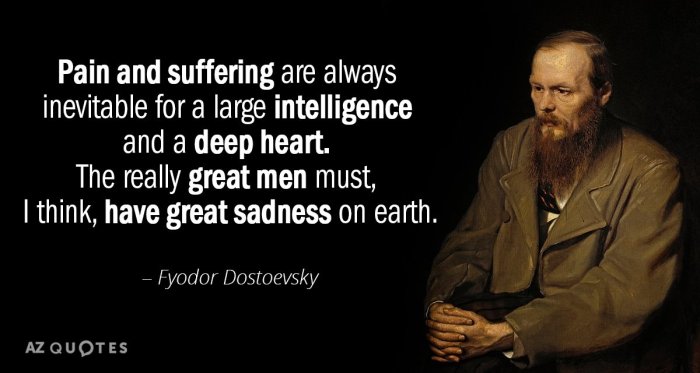
Two of, in my opinion, the greatest authors ever (‘I say it so it must be so’ -Dylan) are Fyodor Mikhailovich Dostoyevsky and Valentin Louis Georges Eugène Marcel Proust. What sets these two apart from many others of the great novelists (Sartre, Balzac, Hesse, Sagan et al) is that their work contains an element which transcends the confines of literature and becomes something of great significance.
A little on each author- Dusty was arrested when a meeting of revolutionaries was raided (although there is no evidence that I have seen which suggests that he was ever an active member) and sent to a Siberian camp for four years (see my entry on Suffering for more information). Dusty was led out in the snow, naked, and lined up against the wall, with others, to be executed. Just before the commander laughed (in my imagination) and said ‘sorry boys, we’re just kidding, the ruler was changed last night and you have all been set free,’ the shock and the cold caused Dusty to develop epilepsy. Dusty also spent the last years of his life fleeing from debt collectors given his gambling addiction (see his novel The Gambler for a greater understanding of the pitfalls of gambling). The German philosopher, Nietzsche, said that Dusty was the only psychologist that he had ever learnt anything from.
Proust spent the later years of his life in bed suffering from a life-long chronic illness, in between he wrote À la recherche du temps perdu, a book which spans the entirety of one’s existence in self and in society (note: when he was in his early 20s, the physicist Robert Oppenheimer went on a trip in the mountains. He recounted that he had had his first great love affair whilst there which experts now believe (given his lack of female companions) refers to reading Proust by torch light as the others slept). But what is it, other than beauty of prose, that sets these two apart (note: this is not a subjective analysis (as much as it cannot be) as I would say others are my favorites such as Poe but is attempting to be objective, the irony of which you will see soon)) is their depth and understanding of not just psychology but also of emotion.
The Czech writer Franz Kafka wrote in his letters to Milena Jesenska (with whom he had an affair by letters (mostly)), ‘nobody sings with such pure voices as those in Hell, what we take for the song of angels is their song’, or in other words, those who suffer most sing with the most beauty in their voices, maybe linked to the notion of Michel de Montaigne who said that ‘The most manifest sign of wisdom is a continual cheerfulness; her state is like that of things in the regions above the moon, always clear and serene’ as though they have risen above their clouds of suffering. (Note: this thought is often expressed in popular culture through the unknown quote, ‘The loneliest people are the kindest. The saddest people smile the brightest. The most damaged people are the wisest. All because they do not wish to see anyone else suffer the way they do’)
Both Dusty and Proust suffered greatly however, I believe that the cause for their suffering was actually what hurt them. The work of both is very sensitive and they see all people, no matter how heinous they may be, as being complete and beautiful in themselves, not weird or absurd, but themselves. This could be an example of Martin Buber’s I-Thou where one sees another as being complete in their self and not as an extension of the one looking and through this both Dusty and Proust see the humanity and it must be said, that others (‘Hell is other people’- Sartre) are the greatest of all burdens, to take unto yourself the whole entirety of another is something which must only be reserved for the strongest spirits (‘The most spiritual men, as the strongest, find their happiness where others would find their destruction: in the labyrinth, in hardness against themselves and others, in experiments. Their joy is self-conquest: asceticism becomes in them nature, need, and instinct. Difficult tasks are a privilege to them; to play with burdens that crush others, a recreation. Knowledge–a form of asceticism. They are the most venerable kind of man: that does not preclude their being the most cheerful and the kindliest.’ Nietzsche).
So, to summerise, I believe that the reason for the greatness of the work of the likes of Dusty and Proust comes from their ability to take in the subjectiveness of others and present it in an objective manner whilst still displaying the humanity which enables them to see and feel what many others can’t (see the irony now?). from this we can conclude that which we often call genius is in a large part having a great sensitivity and the ability to transform this into something which is both personal and universal (hey, more irony!).
‘till next time
Note: I would be remiss not to recount the story of Beethoven is this regard. Beethoven suffered from what we now call Asperger’s Syndrome, making most social interaction painful and his senses heightened. Whilst he was starting to go deaf, a gentleman approached him saying that someone he was intimate with had lost a child at birth and had closed off to the world. Beethoven, suffering greatly, went to the lady’s house and played for you pieces he would improvise each time. Eventually, after a few weeks, he seemingly found the scale of which she was emotionally attuned and she broke down in sorrow for the loss of her child, from that point onwards she was better.
Reblogged this on Autism Candles.
LikeLike